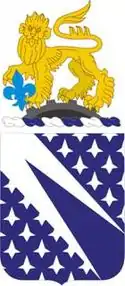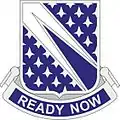89th Cavalry Regiment
The 89th Cavalry Regiment is a Regiment of the United States Army first established in 1940.
| 89th Cavalry Regiment | |
|---|---|
 Coat of Arms | |
| Active | 1940 - present |
| Country | |
| Allegiance | |
| Branch | Armor |
| Type | Cavalry |
| Role | Reconnaissance, Surveillance, and Target Acquisition |
| Size | Regiment |
| Motto(s) | READY NOW! |
| Branch color | Yellow |
| Mascot(s) | Wolverine (1st Squadron) |
| Decorations | Presidential Unit Citation |
| Commanders | |
| Notable commanders | COL Mark Suich |
| Insignia | |
| Distinctive Unit Insignia |  |
U.S. Cavalry Regiments | |
|---|---|
| Previous | Next |
| 82nd Cavalry Regiment | 91st Cavalry Regiment |
History
[1]1st Squadron History
1st Squadron, 89th Cavalry Regiment deployed to Germany in 1944 (then known as 899th Tank Destroyer Battalion). The unit saw little action during the War, but still had notable moments. 1st Squadron was patrolling near a town named Scherpenseel in Holland where they were ambushed by a German artillery unit. They were pinned down until SSG Briles laid down heavy machine gun fire. This suppressive fire resulted in multiple German casualties and surrenders . SSG Briles was awarded the Medal of Honor for his actions.
The next time that the 1st Squadron, 89th Cavalry Regiment had a notable deployment was in 2006 to Iraq. During this fifteen-month deployment, soldiers of the 1st Squadron killed and captured over 200 High-Value Targets (HVT). 1st Squadron also seized 57 major weapons caches, which helped their fight against the Iraqi Insurgency. 1st Squadron, 89th Cavalry Regiment returned to Iraq in 2009. This deployment included training the Iraqi Police, incapacitating HVT's, and raiding known insurgence hideouts and weapon caches.[2]
3rd Squadron History
Shortly after D-DAY, the 3rd Squadron, 89th Cavalry Regiment (then known as the 899th Tank Destroyer Battalion) received a mission in the town of St. Vith. Allied troops discovered German soldiers patrolling near the town. 3rd Squadron's job was to secure the perimeter of the town. While setting up a secure perimeter, German soldiers were spotted. 3rd Squadron and its allies developed a plan to counterattack the Germans. The Germans took out many tanks and had an advantageous high ground position against the dismounted patrol of 3rd Squadron. The Cavalry machine gunners laid down heavy suppressive fire to allow all the allied forces to bound backwards.
3rd Squadron was assigned to a town named Beaufort in December 1944. American forces were under attack so 3rd Squadron was sent as reinforcement. German forces had a heavy presence in Beaufort, patrolling nearly every road. The Squadron suffered many casualties due to an attack from patrolling German unit.
3rd Squadron returned to France after receiving heavy casualties. While in France they performed Military Police duties. Many activation's and deactivation's restricted the unit from deploying again until 2006 in Iraq. The most recent deployment was in 2015 in Afghanistan. They are still active to this day and serve in our country's modern day combat zones.[3]
Lineage
Constituted 1 June 1940 in the Regular Army as the 10th Antitank Battalion.
- Redesignated 99th Antitank Battalion, 11 June 1940.
- Redesignated 99th Infantry Battalion (Antitank) and activated at Fort Lewis Wa. 1 July 1940.
- Redesignated 99th Infantry Antitank Battalion, 24 July 1941.
- Redesignated 899th Tank Destroyer Battalion 15 December 1941.
- Inactivated 27 December 1945 at Camp Kilmer NJ.
- Redesignated 899th Tank Battalion, 23 July 1953
- Activated 17 January 1955 in Germany.
- Inactivated 1 May 1958 in Germany.
- Designated to 89th Cavalry Regiment on 30 March 2004.[4]
Lineage of 1st Squadron
- March 30, 2004- 2nd Squadron, 71st Cavalry Regiment re-flagged to 1st Battalion, 89th Cavalry Regiment
- Known today as 1st Squadron, 89th Cavalry Regiment[5]
Lineage of 3rd Squadron
- July 15, 1942- 89th Cavalry Reconnaissance Group was activated at Camp Carson.
- 1944- 89th Cavalry Reconnaissance Group reactivated to 89th Cavalry Reconnaissance Squadron
- 2006- 89th Cavalry Reconnaissance Squadron reactivated to 3rd Squadron, 89th Cavalry Regiment[6]
Distinctive Unit Insignia
- Description
A Silver color metal and enamel device 1 1/8 inches (2.86 cm) in height overall consisting of a shield blazoned: Azure, semé of caltrops Argent, on a bend of the second an elongated inverted pile of the first. Attached below the shield a Blue scroll inscribed "READY NOW" in Silver letters.
- Symbolism
The sprinkling of silver caltrops, an ancient military instrument, sometimes called "cheval trap" (from the French word horse) from its use in impeding the approach of cavalry-is symbolical of the first duty of the Tank Destroyer Battalions, i.e., to stop the advance of enemy tanks by obstacles strewn in their path and sharp attack from all points. The silver bend represents the forward path to be traveled as well as Highway 99, the birthplace of the unit and the scene of their first arduous convoy. The inverted pile shooting forward from this bend further illustrates advance and the penetrating qualities of the battalion toward any obstacle encountered.
- Background
The distinctive unit insignia was originally approved for the 899th Tank Destroyer Battalion on 6 August 1942. It was redesignated for the 899th Tank Battalion on 25 April 1956. The insignia was redesignated for the 89th Cavalry Regiment on 23 December 2004.
Coat Of Arms
Blazon
- Shield
Azure, semé of caltrops Argent, on a bend of the second an elongated inverted pile of the first.
- Crest
On a wreath of the colors Argent and Azure (Ultramarine Blue) upon a geared wheel of a tank track Proper issuant from base a lion passant guardant Or, the dexter forepaw resting on a fleur-de-lis Celeste. Motto READY NOW.
Symbolism
- Shield
The sprinkling of silver caltrops, an ancient military instrument, sometimes called "cheval trap" (from the French word horse) from its use in impeding the approach of cavalry-is symbolical of the first duty of the Tank Destroyer Battalions, i.e., to stop the advance of enemy tanks by obstacles strewn in their path and sharp attack from all points. The silver bend represents the forward path to be traveled as well as Highway 99, the birthplace of the unit and the scene of their first arduous convoy. The inverted pile shooting forward from this bend further illustrates advance and the penetrating qualities of the battalion toward any obstacle encountered.
- Crest
World War II campaigns in Europe, Italy and the Rhineland are recalled by the lion; the fleur-de-lis represents campaign participation in Northern France, Normandy and Ardennes-Alsace. The geared wheel refers to Tank Battalion heritage and Tank Destroyer history. Gold symbolizes excellence, the grey and Sable of the wheel denote strength and the determination to prevail.
- Background
The coat of arms was originally approved for the 899th Tank Destroyer Battalion on 6 August 1942. It was redesignated for the 899th Tank Battalion on 25 April 1956. The insignia was redesignated for the 89th Cavalry Regiment on 23 December 2004. The coat of arms was amended to add a crest on 9 February 2005.
Current configuration
- 1st Squadron, 89th Cavalry Regiment, 10th Mountain Division
- 3rd Squadron, 89th Cavalry Regiment, 10th Mountain Division
Campaign Streamers
World War II
- Tunisia
- Rome-Arno
- Normandy (with arrowhead)
- Northern France
- Rhineland
- Ardennes-Alsace
- Central Europe
References
![]() This article incorporates public domain material from the United States Army Institute of Heraldry document: "89th Cavalry Regiment".
This article incorporates public domain material from the United States Army Institute of Heraldry document: "89th Cavalry Regiment".
- "1-89 Cav". webcache.googleusercontent.com. Archived from the original on 29 June 2016. Retrieved 5 May 2017.
- Pike, John. "1st Squadron, 89th Cavalry Regiment". www.globalsecurity.org. Retrieved 5 May 2017.
- Pike, John. "3rd Squadron (RSTA), 89th Cavalry Regiment". www.globalsecurity.org. Retrieved 5 May 2017.
- Pike, John. "3rd Squadron (RSTA), 89th Cavalry Regiment". www.globalsecurity.org. Retrieved 5 May 2017.
- Pike, John. "1st Squadron, 89th Cavalry Regiment". www.globalsecurity.org. Retrieved 5 May 2017.
- Pike, John. "3rd Squadron (RSTA), 89th Cavalry Regiment". www.globalsecurity.org. Retrieved 5 May 2017.
External links
- https://web.archive.org/web/20110513005759/http://www.history.army.mil/html/forcestruc/lineages/branches/ar/default.htm
- https://web.archive.org/web/20110513005804/http://www.history.army.mil/html/forcestruc/lineages/branches/cav/default.htm
- http://www.drum.army.mil/2ndBCT/Pages/1-89hist.aspx
- http://www.tankdestroyersociety.com/899th_tank_destroyer_battalion.htm
- http://www.globalsecurity.org/military/agency/army/3-89cav.htm
- http://www.globalsecurity.org/military/agency/army/1-89cav.htm